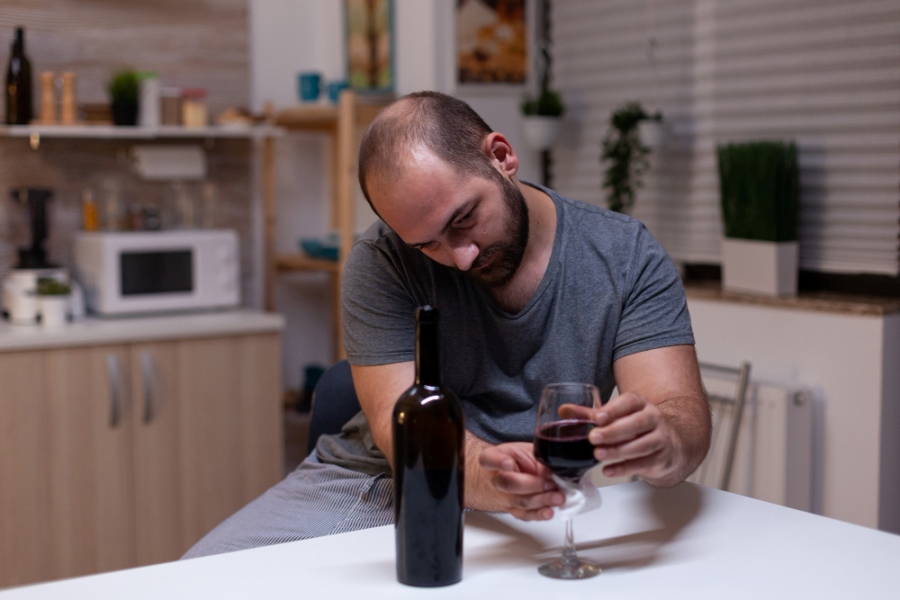Managing diabetes involves close monitoring of blood sugar levels, medications, and lifestyle choices. But when alcohol is added to the mix, things can quickly get complicated. In fact, alcohol can impact your blood sugar, interact with your meds, and make it harder to manage diabetes safely.
Inevitably, diabetes and alcohol addiction can create a dangerous cycle where poor blood sugar control fuels more health issues, and alcohol use makes it harder to stay on track with treatment. Various diabetic complications from drinking can also occur. So, what should you know about alcohol abuse with diabetes? Can diabetics drink alcohol, or is it best to stop entirely? And what is involved when it comes to quitting alcohol with diabetes?
In this article, we take a closer look, helping you make an informed choice and avoid complications that may arise with diabetes and alcohol use.
The Dangerous Link Between Diabetes and Alcohol Abuse
Put simply, alcohol alters blood sugar levels and insulin sensitivity. When you drink, your liver prioritizes processing alcohol over maintaining stable glucose levels. This means that your liver stops releasing stored glucose when your blood sugar levels drop, setting you up for potentially dangerous hypoglycemic episodes. At the same time, alcohol can cause blood sugar spikes, especially when mixed with sugary drinks or consumed with carbohydrate-heavy meals.
Alcohol’s effects on blood sugar can also last for hours after you stop drinking, often hitting the hardest when you’re asleep and unable to recognize warning signs. Symptoms of intoxication, such as confusion, dizziness, and slurred speech, mirror those of low blood sugar. And this also makes it tricky to distinguish between being drunk and experiencing a medical emergency. This confusion has led to fatal outcomes when hypoglycemia from drinking goes untreated.
As you’ve probably gathered by now, alcohol and blood sugar issues, like diabetes, don’t mix. Alcohol puts extra strain on your body, especially on blood vessels that are already weakened by diabetes. This speeds up nerve damage, kidney problems, and vision issues. It also puts more stress on your pancreas, which is already struggling to manage insulin. All of this can lead to serious complications much sooner than expected.
Why Alcohol Is So Risky for Diabetics
Substance abuse in diabetics leads down a slippery slope. Ultimately, alcohol damages the liver and pancreas, two organs already working overtime to manage blood sugar.
As previously mentioned, the liver prioritizes processing alcohol as a toxin, which means it stops releasing glucose when your body needs it most. Meanwhile, alcohol inflames the pancreas, further compromising insulin production and regulation. Together, this sets the stage for unstable blood sugar levels and make managing diabetes much more difficult.
For those using insulin, alcohol can further trigger a dangerous chain reaction. If your body can’t use glucose properly, it starts breaking down fat for energy, producing ketones as a byproduct. When too many ketones build up, it can lead to diabetic ketoacidosis, a life-threatening condition.
On top of the physical risks, alcohol disrupts daily diabetes care. It can interfere with how your body processes medications, making blood sugar unpredictable. While drinking, you might forget to eat, skip a blood sugar check, or misjudge an insulin dose. These small slips, when layered on top of already strained systems, can quickly lead to a medical emergency.
Common Warning Signs of Addiction in Diabetics
Alcohol misuse can be hard to spot, especially when it’s normalized in social settings. But for those managing diabetes, certain red flags may signal a deeper problem and should never be ignored, such as:
- Drinking despite clear medical advice to stop
- Frequent low or high blood sugar episodes tied to alcohol use
- Skipping insulin doses or meals in order to drink
- Hiding drinking habits or making excuses for alcohol use
- Worsening health and difficulty keeping blood sugar stable
Is It Ever Safe for Diabetics to Drink?
Considering the insulin and alcohol interaction that can lead to hypoglycemia, it’s important to either not drink as a diabetic or monitor it closely, if you choose to drink. It also depends on your specific situation.
Some people with well-controlled diabetes can occasionally drink small amounts under proper medical supervision. This means one drink for women and two for men, with food, and never when blood sugar levels are unstable. It’s also important that your doctor knows about any alcohol use to adjust medications and monitoring.
However, if you struggle to stick to these limits, moderation isn’t realistic. Many people with diabetes find that any alcohol leads to poor choices about food, medication, and blood sugar monitoring. For anyone with a history of alcohol addiction, complete abstinence is the only safe approach.
Why Rehab Is Essential for Diabetics Struggling With Alcohol
Rehab for diabetics offers a pathway toward sobriety, especially if you’re struggling to quit despite obvious health repercussions. It often starts with a medical detox. This medical detox for alcohol addiction is tailored specifically to your needs, with proper diabetic and blood sugar monitoring, ensuring complications don’t arise. It’s essential to do this under 24/7 medical supervision to avoid health issues and receive ample support.
After your initial detox, rehab will involve:
- Nutritional support and education
- Therapies (like CBT) to treat addiction triggers and address the underlying causes of addiction
- Learning healthy coping mechanisms and relaxation/stress-reduction techniques
- Peer support and group therapy
Ultimately, alcohol addiction and diabetes need to be treated together, with consideration regarding how one impacts the other. And yes, it’s entirely possible to make a full recovery and lead a fulfilling and healthy life, even with diabetes.
How Genesis House Supports Dual Conditions Like Diabetes and Addiction
At Genesis House, our team provides specialized dual-diagnosis treatment with medical professionals who understand both diabetes and addiction. We manage safe detoxification while monitoring blood sugar levels and working closely with nutritionists to establish healthy eating patterns.
Our counselors further address the emotional challenges of managing chronic illness and addiction simultaneously. We include family education and create long-term health plans that prevent relapse while maintaining diabetes control through ongoing support. With a compassionate, whole-person approach, Genesis House helps you regain control of your health, physically, mentally, and emotionally, so you can move forward with confidence and stability.
When the Risks Are Too High to Ignore
Living with diabetes while struggling with alcohol addiction or abuse can be very dangerous. The risks include diabetic coma, nerve damage, vision loss, amputation, and even death. And these events become more likely the longer treatment is delayed.
But there is a way forward. If you’re coping with both conditions, you don’t have to do it alone. Call us today to start a safe, medically guided recovery, so your health doesn’t have to keep paying the price.






